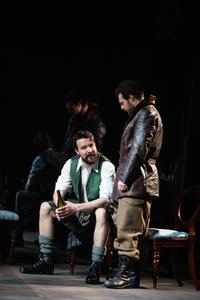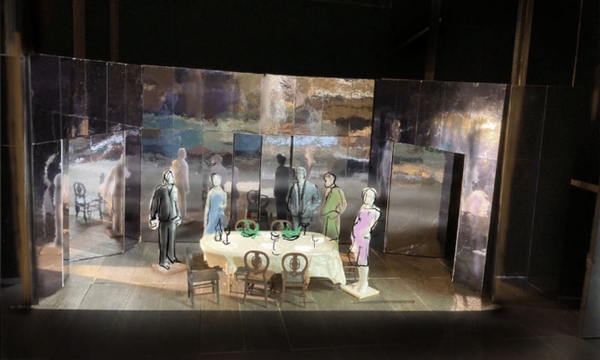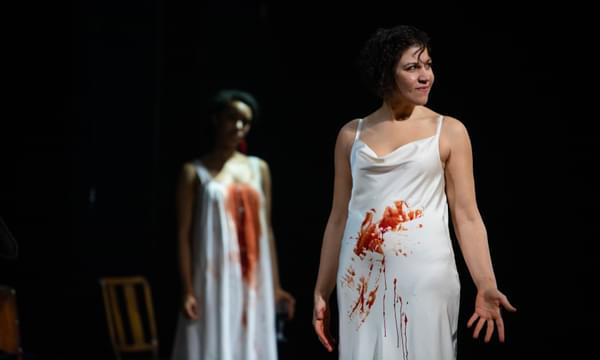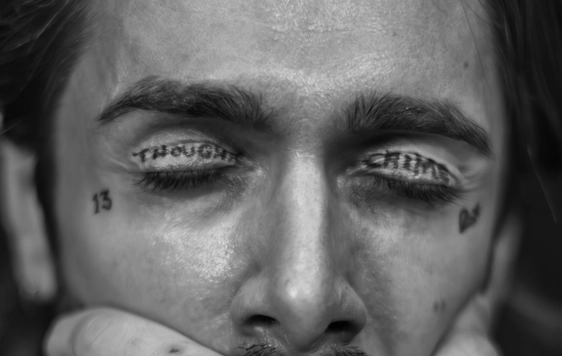News Story
What do you think of when you think of a theatre producer? Do you think of someone who makes amazing shows happen, do you think about the glamour of working with actors and directors, do you think about the excitement of press night and working in a theatre? Or do you think of admin, budgeting and stress?
I was lucky enough to get to sit down with Hannah and Lucy who are producing Macbeth (an undoing) here at The Lyceum and ask them 101 questions from how they got into producing to what they are most excited to see in Zinnie’s version of Macbeth. Everything from the glamourous to the not-so-glamourous. Let’s get started!
Hi ladies, thank you so much for sitting down with me. Producing seems like a pretty exclusive club that no one really knows how to get into. Let’s start with how you got into producing. What was your journey?
Hannah: There is no ‘one route’ to take. I studied a degree in Theatre Studies which had an admin module learning to it, where we learnt about budgets etc, this allowed me to identify that I was interested in producing and the admin side of performances more so than the acting. I then did a lot of internships, which obviously isn’t possible for everyone as they were unpaid. I moved to London and had to work two jobs, one to pay the bills and one to get the experience in theatre, basically 80-hour weeks so that I could throw myself into the industry. My first internship was at the Finborough Theatre, artistic-led, new writing venue. I then went to The Old Vic where I had to make myself indispensable, this landed my first paid job. My first roles had either administrator or assistant in the job title. It is hard to get into the industry, you have to network and get to know people and making that leap into having producer in your title feels like a big one, but you just have to trust yourself and don’t second guess yourself.
Lucy: I studied Theatre & English Literature. Quickly realised that I wanted to be in theatre but didn’t want to act or direct but didn’t know what that could be. I too started in an unpaid internship, with The Arches Theatre in Glasgow. Through that I worked closely with their Creative Learning producer which made me realise that I was interested in that department and the work they did. After that I worked at the Traverse in Edinburgh in an admin and creative learning role. I then decided to do a masters in London in Applied Theatre at Central School of Speech and Drama. While there I did more unpaid internships, one of them was at Company 3 (used to be Islington Community Theatre) and as part of that they took a show to the National Theatre in London. I got the opportunity to be the assistant producer for the show. Through this project I made connections at the National Theatre and got a job firstly as an administrator in the department and then progressed to NT Connections coordinator and was assistant producer for that project which I loved. I then moved back to Scotland and decided to take a sidestep into Artistic Development with the National Theatre of Scotland, which was a brilliant role.
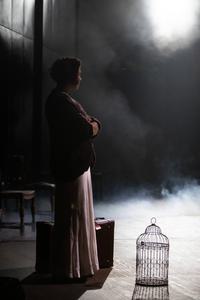
“Just get into a theatre in any capacity, network and get to know the people who work there, you never know the steps that could follow. But know your worth”
Hannah
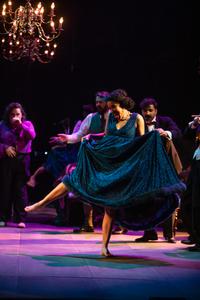
There will be people reading this who are thinking about the next steps in their life/career and that may be into producing. What would you say to someone who wants to get into producing?
Lucy: See a lot of theatre.
Hannah: Advice someone gave to me at the start of my career was just to produce something. An artist asked me to produce their fringe show for them right when I first started and I just did it so could say that I knew how to produce a show. That then lead me to my first assistant producer role. You might have to do it around your day job first so that you can see if you actually like it or not.
Lucy: Network with people in the industry. Don’t be afraid to ask for help and to ask people to go for a coffee to talk about their journey into their job. I did a lot of that when I came to Edinburgh, remember to ask a whole range of people not just producers. I asked administrators, directors and so many others which got my name out into the theatre world and that got me my first job. Don’t be afraid to do this, I’d be surprised if someone said they didn’t have time to talk to you.
What qualities does a good producer need to have?
Hannah: It depends on what kind of producer job title you are going to have. I think the qualities that myself and Lucy bring are that we are personable and highly organised as you have to be on top of everything. To name a couple.
Lucy: You have got to have quite a critical eye, not necessarily in a negative way but you ‘ve got to be able to look at something and give an opinion one way or another whether that’s about a budget or a creative choice. Be responsive to challenges and tasks that come up and be able to manage them in a calm and diplomatic way. Read lots of job descriptions to see what employers tend to look for.
People have lots of different ideas about what a producer does in a theatre. Can you talk me through a typical day for you?
Lucy: There is no typical day. There are always multiple ongoing projects, so we would check each morning where the project is at. So, for example, we have some Research and Development workshops for a performance next week which is quite urgent, we are working on casting, talking to agents to find out actors’ availability, writing contracts and sorting accommodation. We have multiple meetings a day for more long-term projects such as design meetings, long term planning for upcoming projects as well as day-to-day running of current projects.
Hannah: It’s a fast-paced job with a lot of meetings which can change things very quickly.
Lucy: It’s important to always have space to be receptive to things that are happening that you weren’t expecting which will disrupt all the planning you have done for the day in advance.
Hannah: Expect people to pop in to see you and ask for things to be done quickly.
Lucy: Relationship management is important to the day as well. After a meeting you need to check in with everyone and make sure everyone is happy and if they aren’t work out why and rectify any problems.
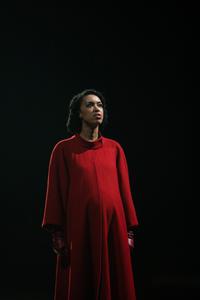
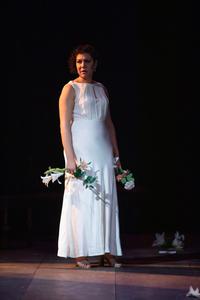
So, what is your favourite and least favourite part of the job?
Lucy: My favourite part is two-fold. Working with people and seeing something being realised. I love working with a whole range of people to make something together. There is nothing more exciting than seeing something on its feet. Whether that is a rehearsal, first run or opening night after it all lands into place.
Least favourite – the tying up after a project for reporting or recovering receipts. You can take a breath when the performances are over and then you realise you still have lots of work to do before you can be creative again. And if you haven’t been organised – it's a nightmare!
Hannah: My favourite part is the magic of theatre, it’s an exciting environment to work in. That buzz is why we do it.
My least favourite part is having those difficult conversations where you have to say no. Or working with difficult people – it would be lovely if everyone was happy all the time, but this can be a stressful world to work in.
I’ve got to ask…do you have to be good at maths to budget a show?
Hannah: No, you don’t have to be good at maths as we have brilliant spreadsheets, computers and calculators to do that for us. I did okay at maths at school, but I didn’t like it, so I'm always surprised how much I enjoy budgeting now.
Lucy: Budgets are crucial but there are lots of great free courses that you can take on budgeting if you think that is something you want to work on. ICT and FST do one specifically for arts organisations.
It’s a big part of the job but organisations normally have templates in place.
Hannah: You can always look back on past productions and see how much things costed to get a starting point. Budgets always change and nobody knows how to do a perfect one first time!
Tell us something people don’t know about your role
Hannah: Some people think that we are glorified administrators, which we are. We are the organisers, but an important part of our job is to look after people through the process.
Lucy: There is a lot of computer time.
Hannah: Also, there is a lot of versions of the role, people call themselves different things and they can all mean different things and have slightly different roles. Depending on someone's view of a producer, they will treat you a certain way, so you constantly change who you are to different people.
Lucy: It is an ever-changing role. There are some very specific things that a producer does, but it is also a very wide-ranging job where no two days are ever the same.
Have you ever produced a Shakespeare play before? What is your favourite of his plays?
Hannah: No, I don’t think I have, but I was Iago in Othello at college...which made me realise acting wasn’t for me! My favourite has got to be Much Ado About Nothing with the couples and the comedy.
Lucy: I haven’t either actually. Romeo and Juliet is my favourite, an absolute classic.
So, what would you say to someone thinking of buying a ticket to come and see Macbeth (an undoing)?
Hannah: Even if you aren’t a fan of Shakespeare, come and see this. Keeping the stories alive is important and what Zinnie is doing with Macbeth is really exiting. I like that this version isn’t straight Shakespeare. It is much more accessible while keeping some of the key phrases and lines for familiarity. Her approach to the adaptation is what we should be doing with Shakespeare across the board.
Lucy: Zinnie has made Macbeth into an accessible and feminist (no spoilers) performance. I am excited to see how the story translates to a new audience.
Hannah: There are a few unexpected twists, amazing costumes and it will be a visually stunning production!
